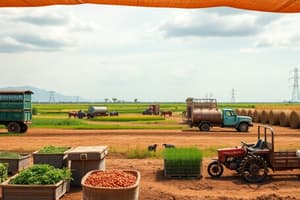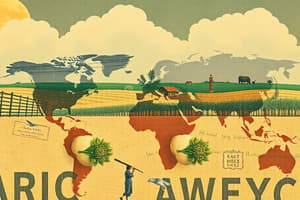Podcast
Questions and Answers
What is the main focus of the study?
What is the main focus of the study?
To determine the effects of abolishing import and export taxes on agricultural products between Lao PDR and Thailand.
What are the three scenarios explored in this research?
What are the three scenarios explored in this research?
- Zero import tax policy from Thailand to Laos (correct)
- Zero import tax policy from Laos to Thailand (correct)
- Both countries implement zero taxes policy (correct)
- None of the above
What was the maximum import tax rate in Laos before the New Economic Mechanism?
What was the maximum import tax rate in Laos before the New Economic Mechanism?
150%
Which organization provides the data used in this study?
Which organization provides the data used in this study?
Thailand is the Lao PDR's biggest trading partner.
Thailand is the Lao PDR's biggest trading partner.
What significant change occurred to tariffs on agricultural products in Laos by 2015?
What significant change occurred to tariffs on agricultural products in Laos by 2015?
The _____ of the study includes informing stakeholders about rising trade costs from NTMs in Laos and Thailand.
The _____ of the study includes informing stakeholders about rising trade costs from NTMs in Laos and Thailand.
What is the trend of Thailand's trade according to the data?
What is the trend of Thailand's trade according to the data?
What was the welfare baseline for Laos in the year 2012?
What was the welfare baseline for Laos in the year 2012?
Which scenario shows an increase in Laos welfare?
Which scenario shows an increase in Laos welfare?
What is the impact on Thailand's welfare according to Scenario-1?
What is the impact on Thailand's welfare according to Scenario-1?
What were the challenges faced in the research?
What were the challenges faced in the research?
If both countries received 0% tariff exemption, Thailand's GDP initially increases but later _____.
If both countries received 0% tariff exemption, Thailand's GDP initially increases but later _____.
What program is used for CGE analysis?
What program is used for CGE analysis?
How many countries are included in the regional aggregation?
How many countries are included in the regional aggregation?
How many sectors and products are included in the sectoral aggregation?
How many sectors and products are included in the sectoral aggregation?
How many factors are included in the factorial aggregation?
How many factors are included in the factorial aggregation?
The technical procedure for using Rundynam is simple.
The technical procedure for using Rundynam is simple.
What is the impact on Real GDP after a 0% tax shock?
What is the impact on Real GDP after a 0% tax shock?
In Scenario-1, the impact on Laos Real GDP is a growth of approximately ______%.
In Scenario-1, the impact on Laos Real GDP is a growth of approximately ______%.
In Scenario-2, Laos Real GDP decreases between ______% to ______%.
In Scenario-2, Laos Real GDP decreases between ______% to ______%.
What is the main outcome for Scenario-3 regarding Laos' GDP?
What is the main outcome for Scenario-3 regarding Laos' GDP?
What is the total import tax for Laos from AgFood based on the table presented?
What is the total import tax for Laos from AgFood based on the table presented?
What is the real GDP of Thailand in 2012?
What is the real GDP of Thailand in 2012?
What does 'BL' stand for in the simulations?
What does 'BL' stand for in the simulations?
What is the impact of Scenario-1 on Laos' capital output?
What is the impact of Scenario-1 on Laos' capital output?
Which output decreases for Laos according to the conclusions?
Which output decreases for Laos according to the conclusions?
The trade status of Laos has been improving since 2013.
The trade status of Laos has been improving since 2013.
What was the trade deficit of Laos in the year 2023?
What was the trade deficit of Laos in the year 2023?
In Scenario-2, implementing a 0 tariff exemption from ______ impacts Laos' industry output.
In Scenario-2, implementing a 0 tariff exemption from ______ impacts Laos' industry output.
Which scenario shows an impact of 0.179048 on AgFood for Laos?
Which scenario shows an impact of 0.179048 on AgFood for Laos?
Match the output to its respective change in Laos after 0% tax shock:
Match the output to its respective change in Laos after 0% tax shock:
Thailand sees a growth in ______ after the 0% tax shock.
Thailand sees a growth in ______ after the 0% tax shock.
What trend does Thailand exhibit regarding its trade volume from 2012 to 2030?
What trend does Thailand exhibit regarding its trade volume from 2012 to 2030?
Flashcards are hidden until you start studying
Study Notes
Introduction
- Study investigates the impact of abolishing agricultural product taxes on trade between Laos and Thailand.
- Empirical analysis employs the Dynamic CGE model to evaluate economic, trade, and welfare implications of tax changes.
Objectives and Significance
- Determine effects of eliminating import and export taxes on agricultural products.
- Compare economic impacts for Laos and Thailand under various tax abolition scenarios.
- Research aims to inform stakeholders about rising trade costs due to non-tariff measures (NTMs).
- Goal includes fostering better discussions on agricultural trade policies to stimulate economic growth and trade facilitation.
Background of Tariff in Laos
- Laos reduced import taxes significantly from 150% in 1986 to a maximum of 40%; over 50% of products are now taxed below 5%.
- ASEAN and AFTA initiatives have further decreased trade barriers for Laos, nearing complete tariff elimination by 2015.
- Thailand is the largest trading partner for Laos, emphasizing the importance of tariffs on trade dynamics and economic health.
Study Parameters
- Focuses on predicting effects of a 0% tax policy on GDP, trade, and social welfare from 2025 to 2030.
- Utilizes Global Trade Analysis Project (GTAP), IMF, and World Development Indicators (WDI) for data.
- Three scenarios analyzed:
- Zero import tax from Thailand to Laos.
- Zero import tax from Laos to Thailand.
- Both countries adopting a zero-tax policy.
Literature Review Highlights
- Theoretical literature includes evaluations of the US-China trade war and free trade agreements in Southern Africa.
- Descriptive studies assess regional trade impacts relevant to tax and trade policies.
Research Methodology
- Employs a combination of descriptive and quantitative methods.
- Utilizes secondary data from IMF and GTAP databases for GDP and trade analysis.
- Estimation tools include GEMPACK programs, GTAP, and World Bank data.
- Uses CGE model approaches for granular analysis of regional, sectoral, and factorial impacts.
Independent and Dependent Variables
- Independent variable: Taxes imposed on bilateral trade.
- Dependent variables: GDP, trade volumes, and welfare metrics.
- Examines the effects of non-tariff measures on overall trade dynamics and economic indicators in a comparative framework.
Practical Implications
- Outcomes aim to better strategize trade elimination hurdles to enhance Laos's economic landscape.
- Study encourages stakeholder engagement for improved trade policies and agricultural economic strategies.### Impact Scenarios using Rundynam
- Rundynam is utilized for simulating impact scenarios within economic models.
- GEMPACK is identified as a program for Computable General Equilibrium (CGE) analysis.
Regional and Sectoral Aggregation
- Analysis involves regional aggregation covering over 160 countries.
- Sectoral aggregation includes three main sectors and 56 products.
- Factorial aggregation consists of five distinct factors.
Simulation Results Overview
- Simulations analyzed import taxes of Laos and Thailand across various sectors.
- Includes agricultural food products (AgFood), manufacturing (Mnfc), and services.
Import Tax Analysis
- Laos imposes zero import tax on AgFood, while Thailand on AgFood has significant import tax implications.
- Thailand's import structure shows notable tax impacts on agricultural products and manufactured goods.
Real GDP Baseline Data
- Baseline GDP for Lao PDR, Thailand, and the Rest of the World outlined for the years 2012-2030.
- Fluctuating growth rates observed, particularly a significant decline in 2020 due to external shocks.
GDP Impact Scenarios
- Three distinct scenarios analyzed:
- Scenario-1: Impact of zero tariff exemption from Thailand.
- Scenario-2: Impact of zero tariff exemption from Laos.
- Scenario-3: Impact of zero tariff exemption from both countries.
Impact on Real GDP Projections
- Laos under Scenario-1 sees minor growth; Thailand remains stable.
- Scenario-2 indicates potential declines in Laos’ GDP due to increased imports without tariffs.
- Scenario-3 exhibits overall gradual improvement for Laos’s GDP, with projections of significant financial benefits by 2030.
Conclusions on Real GDP
- Laos exhibits growth of 0.01%-0.025% in Scenario-1, while Thailand shows a minimal positive change.
- In Scenario-2, Laos faces GDP decline attributed to import influx, while Thailand benefits marginally.
- Scenario-3 predicts increased GDP for Laos by approximately 0.078%, equating to an increase in economic output of $1-2 billion compared to existing GDP.
Productivity Output Baseline
-
Productivity output metrics are established to evaluate economic efficiency and sector performance relative to tariffs and trade dynamics.### Impact on Industry Output
-
Laos Output Changes:
- Growth in capital (0.03%), manufacture (0.21%), service (0.03%), CGDS (0.07%).
- Decrease in agricultural output (-0.31%).
-
Thailand Output Changes:
- Growth in capital (0.03%), services (0.0003%), CGDS (0.002%).
- Decrease in manufacture (-0.001%).
-
Scenario 2 (Tariff Exemption from Laos):
- Laos experiences growth in agriculture (0.17%) but declines in capital (-0.02%), manufacture (-0.84%), services (-0.12%), and CGDS (-0.07%).
- Thailand sees small growth in capital (0.003%), manufacture (0.002%), and CGDS (0.0006%), while agriculture (-0.003%) and service (-0.0006%) decrease.
-
Scenario 3 (Tariff Exemption from Both):
- Declines in manufacture (-0.62%), services (-0.08%) for Laos, with growth in capital (0.01%), agriculture (0.15%), and CGDS (0.001%).
- Thailand shows growth in capital (0.001%), manufacture (0.0007%), agriculture (0.004%), and CGDS (0.002%), with a minor decrease in services (-0.0001%).
Trade Dynamics
-
Laos Trade Trends (2012 to 2030):
- Persistent trade deficits beginning in 2013, reaching -0.6618 in 2023.
- Scenario-1 estimates a reduced trade deficit of -0.33 by 2030.
-
Thailand Trade Trends (2012 to 2030):
- Stable trade performance with no decline, gradually increasing trade figures leading to 0.044807 in 2030.
-
Overall Trade Impact:
- Scenario 2 projects further reduction of Laos trade deficit to -0.06 by 2030.
- Scenario 3 predicts a decline to -0.13, indicating a continuing improvement in trade balance for Laos under tariff exemptions.
Simulation Scenarios Explained
- Baseline (BL): Represents "business as usual" without tariffs.
- Scenario-1: 0% tariff exemption from Thailand.
- Scenario-2: 0% tariff exemption from Laos.
- Scenario-3: 0% tariff exemption from both countries.
Fixed Factors of Production
- Land and natural resources categorized as fixed, meaning their quantities cannot be adjusted quickly in response to output changes.
- Unskilled and skilled labor levels remain constant throughout tax shocks, affecting overall industry output stability.
Studying That Suits You
Use AI to generate personalized quizzes and flashcards to suit your learning preferences.




